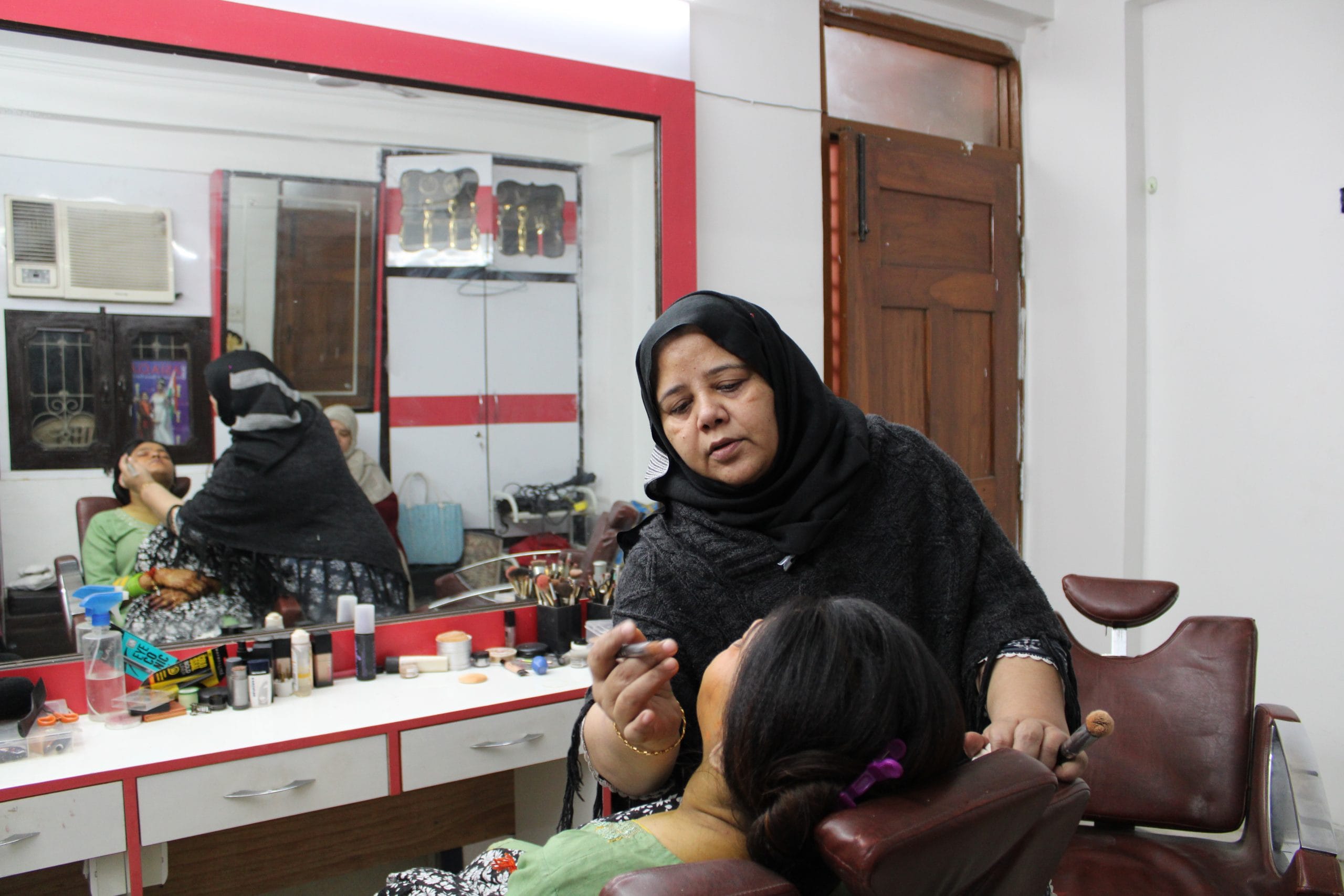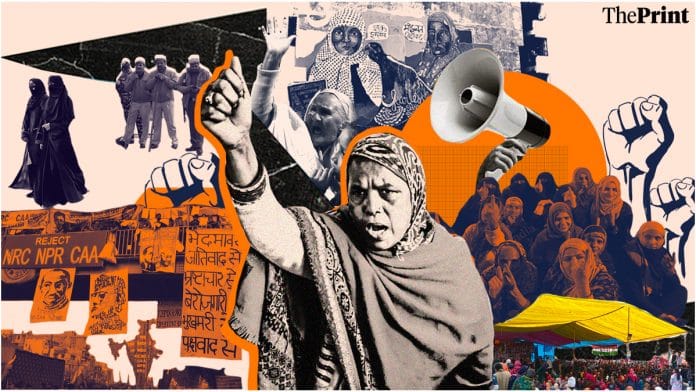When 25 women from Shaheen Bagh went to protest the hijab ban in Karnataka colleges earlier this year, the police were ready with a deployment three times the size of the demonstrators. They kept a tight watch on the women.
That’s the alarm that just the name of Shaheen Bagh sets off even today.
The landmark anti-CAA protests by Shaheen Bagh ended almost three years ago. But what has largely gone unnoticed is how the protests fueled a new energy among young Muslim women in the neighbourhood, sparking a million small mutinies every day – from hijab to menstruation to resisting bulldozers. These mini-revolutions have flown under the radar of headlines mostly focused on Shaheen Bagh leaders arrested on UAPA charges.
The long sit-ins and nightlong vigils during the CAA protests have thrown open the public sphere for young teens here. After shouting ‘kagaz nahin dikhayenge’ (We won’t show the NRC papers) slogans, they have now found their voice.
“The Shaheen Bagh movement is not over yet. It is still going on and is alive in us. Raising our voice against wrong is Shaheen Bagh,” said Taiyyaba Razique, a 30-year-old doctor, with pride.
She is part of a group of 10 residents of Shaheen Bagh who are fighting for better civic amenities, educating young girls on menstrual hygiene, and holding skill development workshops for the youth. They keep abreast of national events and mobilise quickly to lend their voice, like in the case of the hijab protest.
The women and their families are shunned and stigmatised. Most are denied job opportunities, and others are facing financial ruin. And the police are always watching.
“The administration thinks that we will not get up if we sit,” said Shagufta, a 47-year-old former teacher, bursting into laughter. Her anger is tempered with humour.
A few metres from where Taiyyaba works, makeup artist Hena Ahmed (50) carefully applies a layer of foundation for a young bride. As she steps back to make sure the base coat is evenly applied, she recounts the camaraderie among the women protesters, the food they shared with each other, and the nagging worry about their children, parents, and partners back home.
But within a few minutes, her cheerful demeanour gives way to anger and frustration. The agency that the Shaheen Bagh protest gave them has come at a steep price. “Whenever we try to participate in any demonstration or even gather at one place, the police turn our area into a cantonment,” said Hena.
Hena is now a well-known face in the area and an active member of the Shaheen Bagh movement. She claims that her networking skills are so strong that she can gather a group of people with a single phone call. She started her makeup salon in 2015.
On 15 December 2019, the women of Shaheen Bagh started a protest against the CAA-NRC and the brutal police crackdown on students in Jamia Millia Islamia. This movement was ‘leaderless’, and is often referred to by supporters as the site of modern satyagraha (a policy of passive political resistance). On 24 March 2020, the agitating women left the protest site.
Also read: ‘Say yes to the universe, it says yes back’ — there’s a new manifestation industry in India
PIN Code stigma
Depending on who you ask, Shaheen Bagh can evoke pride and hate. The neighbourhood has been valorised and demonised, and the residents know that it will never be easy to be ordinary again.
The women feel the stigma every day. Some claim that autos and taxis refuse a ride when they learn that the designation is Shaheen Bagh. If their address is Shaheen Bagh, or their PIN code is 110025, it is held against them.
Hena’s daughter Hiba, a chef by profession, had to leave her internship at a five-star hotel because of the constant bullying. “She is only 24 years old. People kept pointing out that she lives in ‘mini-Pakistan’,” said Hena. She tried bringing it up with the senior management, but when attitudes did not change, she quit.
The number of clients who come to Hena’s makeup studio has reduced from 50-60 a month to 10-15 since the protest. Only local residents, like the young brides, go to her. “As soon as my clients come to know that my makeup studio is in Shaheen Bagh and that I live there, they cancel their bookings, even after giving their advance,” said Hena, who has tried masking the address of her studio.
She even removed Shaheen Bagh from her studio’s address on Google and changed it to Jasola Extension to counter the slew of negative reviews online. “Earlier, I used to get a lot of client bookings. I was even invited as a guest to their weddings. I used to have so much work that I had to write down. Now, it is such a situation that I have to wait for the client to come,” Hena added.

When people hear about Shaheen Bagh, they immediately think of agitation, UAPA, police, and stereotypical images of Muslims. But no one talks about the lack of infrastructure in the neighbourhood, the health hazards, below-par education institutions, or congestion.
“For the last three years, I have asked many NGOs to set up health awareness camps in Shaheen Bagh. Because most of the girls in this area face problems like PCOD and infertility. But everyone refuses,” said Taiyyaba.
Also read: Frickin’ darn it! What swear words and their ‘clean’ substitutes share across languages
Building confidence
The women refuse to be browbeaten or stop what they began three years ago. Shaheen Bagh taught them how to reclaim their agency. They’ve started giving vocational training to girls from lower-income backgrounds. Some are from adjoining areas like Abul Fazal Enclave, Batla House, and Okhla Vihar. They conduct tuition classes for school and college-going girls.
“Our aim is to educate all girls and women and make sure they complete at least the Class 10,” said Shagufta, one of the women leading this quiet revolution from within. In 2020, they launched a multipurpose centre that trains a new batch of girls every four to six months. They train young women to become professional makeup artists and teach them how to sew. It’s also where Taiyyaba conducts workshops related to periods and hygiene.
Health awareness is high on the agenda, and girls are encouraged to talk openly about issues like menstruation, which is considered a ‘taboo’. “Earlier, I did not know a lot about periods, but now I have learned so much about it from this workshop,” said Huda Alam (13) in a phone conversation with ThePrint. “Earlier, I did not take bath during periods, but now I know that it is not good for my health. I have also received information about when to change pads.”
Now, Huda, who was diagnosed with PCOD, is confident when she talks about her periods. She is an evangelist of sorts among her circle of friends, explaining all that she has learned from Taiyyaba. But the declining business and the lack of outside support have created a new challenge for these women. They are working to empower these girls by investing money from their own pockets to run the centre.
It costs around Rs 30,000-40,000 to run it. “We are not taking any funds to run this centre. Each of us contributes in whatever way we can. Someone helps us by giving us their sewing machine. Sometimes, they help by fixing broken equipment at no cost. We have not even registered this organisation as an NGO. It is a service for us,” said Hena.
Also read: ‘Felt like a spy’ — an undercover Indore policewoman busts ‘ragging gang’ at medical college
Organised due to fear
Where earlier they would take orders, now they give them. But the biggest reason behind this mobilisation is to break the shackles of “fear”. “After the Shaheen Bagh movement, people were put in jail by imposing UAPA. Cases were filed against them,” said Taiyyaba. “Work has been done to instill fear in the mind that if you come forward, you will go straight to prison and there will be no one behind you. In this way, the fear of UAPA and police have been instilled in the minds of the people,” Hena added.
This fear has also affected political participation. “Now people are a little hesitant to take part in it. If today one of us is picked up by the police or something happens to someone, at least we can support each other,” Hena said.
The women are quick to emphasise that they are not a political organisation or one with a political agenda. “If we want to do something for society, we can do it without indulging in political activities. So, we, the women of Shaheen Bagh, are associated with each other through social work,” she added.
But there’s always the threat of bulldozers. In May this year, massive machines inched their way, under heavy police deployment, into the busy market area as part of the South Delhi Municipal Corporation’s anti-encroachment drive. Hundreds of residents and traders came out onto the streets in protest, and Congress workers joined in. The demolition drive was ultimately called off. “We are not against the government, but we will raise our voice against whatever wrong it does,” said Shagufta.
Not everyone is still out on the street protesting. Muslims who previously lived in other areas are being forced to relocate to Jamia Nagar or Muslim-dominated areas. The majority of people in Shaheen Bagh or Jamia Nagar feel safe in this area.
Nidha Praveen, a Tata Institute of Social Sciences (TISS) student and who has now moved to Mumbai, was one of the Muslim women targeted by the people behind the Bulli Bai app, that allegedly held a fake auction of Muslim women and harassed them online.
In October, she was elected vice-president of the TISS Students’ Union. “We are getting easily targeted. We are being dehumanised on social media, like I was a victim of Bully Bai,” said Nidha, who was quite active in the Shaheen Bagh movement.
Though active on social media, she and others like her have started scrutinising their posts and are careful about what they say to the media. “I’m not scared, but sometimes I’m just tired. Tired of being brave all the time.”
(Edited by Tarannum Khan)






